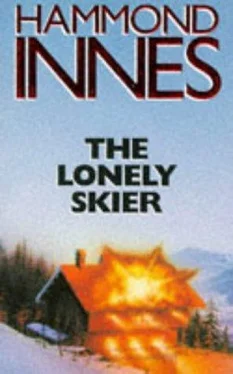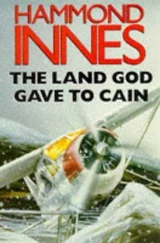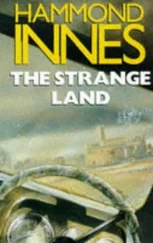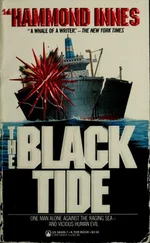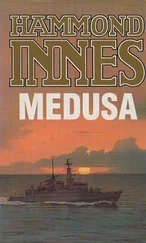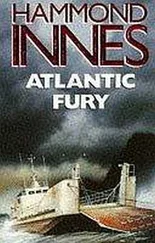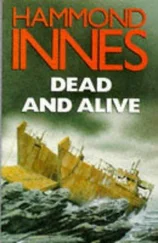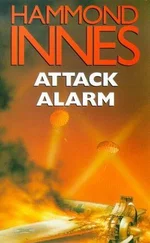Hammond Innes - The Lonely Skier
Здесь есть возможность читать онлайн «Hammond Innes - The Lonely Skier» весь текст электронной книги совершенно бесплатно (целиком полную версию без сокращений). В некоторых случаях можно слушать аудио, скачать через торрент в формате fb2 и присутствует краткое содержание. Жанр: Прочие приключения, на английском языке. Описание произведения, (предисловие) а так же отзывы посетителей доступны на портале библиотеки ЛибКат.
- Название:The Lonely Skier
- Автор:
- Жанр:
- Год:неизвестен
- ISBN:нет данных
- Рейтинг книги:3 / 5. Голосов: 1
-
Избранное:Добавить в избранное
- Отзывы:
-
Ваша оценка:
- 60
- 1
- 2
- 3
- 4
- 5
The Lonely Skier: краткое содержание, описание и аннотация
Предлагаем к чтению аннотацию, описание, краткое содержание или предисловие (зависит от того, что написал сам автор книги «The Lonely Skier»). Если вы не нашли необходимую информацию о книге — напишите в комментариях, мы постараемся отыскать её.
The Lonely Skier — читать онлайн бесплатно полную книгу (весь текст) целиком
Ниже представлен текст книги, разбитый по страницам. Система сохранения места последней прочитанной страницы, позволяет с удобством читать онлайн бесплатно книгу «The Lonely Skier», без необходимости каждый раз заново искать на чём Вы остановились. Поставьте закладку, и сможете в любой момент перейти на страницу, на которой закончили чтение.
Интервал:
Закладка:
‘Joe woke with a grunt at the sound of the typewriter and stared at Engles with his mouth open, as though he had seen a ghost.
I watched over Engles’ shoulder. He wrote:
SCENARIO OF A THRILLER THAT REALLY HAPPENED
The click of the keys slowed and faltered.The cigarette dropped from his lips and lay on his lap, burning a brown mark on the white of his ski suit. His teeth were grinding together and beads of sweat glistened on his forehead. He raised his fingers to the keyboard again and added another line:
by Neil Blair He stopped then and stared at it with a little smile. A froth of blood bubbled at his lips. His wrists went slack so that the fingers raised a jumble of type arms. Then he gently keeled over and slipped to the floor before I could catch him.
When we picked him up, he was dead.
CHAPTER TEN
I was filled with a bitter hatred for that gold as I looked down at Engles’ body, sprawled limp in the easy-chair in which we had placed it.
What was there in gold? Little bricks of a particularly useless metal — no more. It had no intrinsic value, save that its rarity made it suitable for use as a means of exchange. Yet, though inanimate, it seemed to have a deadly personality of its own. It could draw men from the ends of the earth in search of it. It was like a magnet — and all it attracted was greed. The story of Midas had shown men its uselessness. Yet throughout history, ever since the yellow metal had first been discovered, men had killed each other in the scramble to obtain it. They had subjected thousands to the lingering death of phthisis to drag it from deep mine shafts, from places as far apart as Alaska and the Klondyke. And others had dedicated their lives to a hard gamble in useful products in order to procure it and store it back in underground vaults.
To get hold of this particular little pile of gold, Stelben had slaughtered nine men. And after his death, though the gold was buried in the heart of the Dolomites, it had attracted a group of people from different parts of Europe to squabble and kill each other over it.
Of all the people whom it had drawn up the slittovia to Col da Varda, I was the only one left alive. They had not been a particularly attractive group of characters: Stefan Valdini, gangster and procurer; Carla Rometta, a crook and little better than a common prostitute; Gilbert Mayne, alias Stuart Ross, deserter, gangster and killer; Keramikos, a Nazi agent with Greek nationality. They had all died because of that gold.
And now — Derek Engles.
He had his faults. But he had been a brilliant and attractive personality. He might have been one of the greats of the film world. And now all that remained of him was a body sprawled lifeless in an easy-chair in a mountain hotel in Italy. He would never direct another film. He had even had to pass on to me the responsibility for telling the story of Col da Varda.
Joe was leaning over the body, ripping the clothing away from the wound in the groin. ‘Doesn’t look like a bullet,’ he said as he laid bare the white skin of the stomach.
I peered over his shoulder. It was more a bruise than a wound. The skin seemed to have been burst open in an irregular, ragged tear. The flesh round it was horribly bruised.
Joe shook his head. ‘Something hit him there — and hit him hard.’ He examined the rest of the body. There was no sign of any other wound. He straightened up with a grunt. ‘He must have known he was dying when he came in,’ he said. ‘No one could have an injury like that and not know he was finished. I wonder how far away from here it happened. Every step afterwards must have been agony.’ He walked to the window and looked out. ‘Clouding over, Neil,’ he said, letting the curtain drop again. ‘If it begins to snow again his tracks will be covered up and we’ll never know how it happened.’
‘You mean that we ought to follow his ski tracks back whilst we can?’ I said.
He nodded. ‘Ought to,’ he said. ‘There’s his sister — she’ll want to know. And the Studios will expect a full report. The blood will show us the trail, even if we can’t pick out his ski tracks immediately.’ He walked over to the desk and looked at the sheet of paper in the typewriter. He nodded his head slowly as he read it. ‘Perhaps that’s what brought him back.’
‘How do you mean?’ I asked.
‘Wanted to make certain you’d write the full story for a film,’ he replied. ‘He’d a great flair for knowing what the film-going public wants. He knew they’d like this story, and he didn’t want it wasted.’ He picked up a rubber and began tearing it methodically to pieces. Though he had not been a friend of Engles’, I think his death had affected him more than he would care to admit.
‘I never liked him, you know, Neil,’ he murmured, looking down at the dead body. ‘He wasn’t a man you could really like. You could admire him. Or you could dislike him. But it was difficult to like him. He wasn’t the sort of man who made friends easily. He lived on excitement. Everything had to be whipped up — conversation, work, action. That’s why he drank so much. His nerves needed the sense of exhilaration drink could give him when there was insufficient excitement.’
‘What are you trying to say, Joe?’ I asked.
He looked at me then and tossed the broken rubber into the waste-paper basket. ‘Don’t you see — that’s why he came out here. It wasn’t a sense of responsibility because he had recognised Keramikos as a Nazi agent. It was his craving for excitement. And because he believed there might be the story for a film in it. And that’s why, when he came in here, he sat down at the typewriter and wrote down the title and your name underneath. He knew he was finished. But in spite of the pain, his brain still functioned clearly and he saw what a film it would make. Pity he missed the fire scene. He would have liked that.’
He paused for a moment and stared vacantly at the electric fire. ‘It wasn’t natural for him to sit down at a typewriter, you know,’ he went on. ‘Normally he’d have talked. Verbal self-dramatisation was his hobby. But he wanted the story told with himself as the central figure. He saw himself as —. He had to make sure you’d see it that way. He knew it was the end. And he planned his exit as he struggled through the snow. He wanted an audience. He always needed an audience. And he wanted roadie, sitting at a typewriter with a cigarette dangling from his lips, typing the title of the film and your name underneath. It was the thought of that scene that kept him going. He couldn’t bear a good situation to be wasted. He had to get back, he had to be sure that you would write the script and that the Studios would produce it as the last work of Derek Engles, their famous director.’ He drove his fist into his palm. ‘If only I’d not been asleep, I could have taken a shot of that scene. He would have liked that.’ He stopped then, exhausted by such an unusually long speech. He was massaging his lower lip between his finger and thumb. I think he was near to tears. For though he had no love for Engles as a man, he had great admiration for him as a director.
I went over to the window and looked out. The moon had set now and it was much darker. Clouds were skudding across the stars. ‘Better get going,’ I said. ‘It looks like snow.’
‘Can you make it?’ he asked. ‘You’ve had a pretty thick two days.’
‘I’m all right,’ I told him.
He went out then and woke the porter. Our ski things were in the kitchen, drying before the fire. Before we left, I locked the door of the manager’s office and gave the key to the porter with instructions that no one but the manager was to be allowed into the office. ‘The man who came in just now has died,’ I told him in Italian. ‘We will return in an hour or two and speak to the manager’
Читать дальшеИнтервал:
Закладка:
Похожие книги на «The Lonely Skier»
Представляем Вашему вниманию похожие книги на «The Lonely Skier» списком для выбора. Мы отобрали схожую по названию и смыслу литературу в надежде предоставить читателям больше вариантов отыскать новые, интересные, ещё непрочитанные произведения.
Обсуждение, отзывы о книге «The Lonely Skier» и просто собственные мнения читателей. Оставьте ваши комментарии, напишите, что Вы думаете о произведении, его смысле или главных героях. Укажите что конкретно понравилось, а что нет, и почему Вы так считаете.
